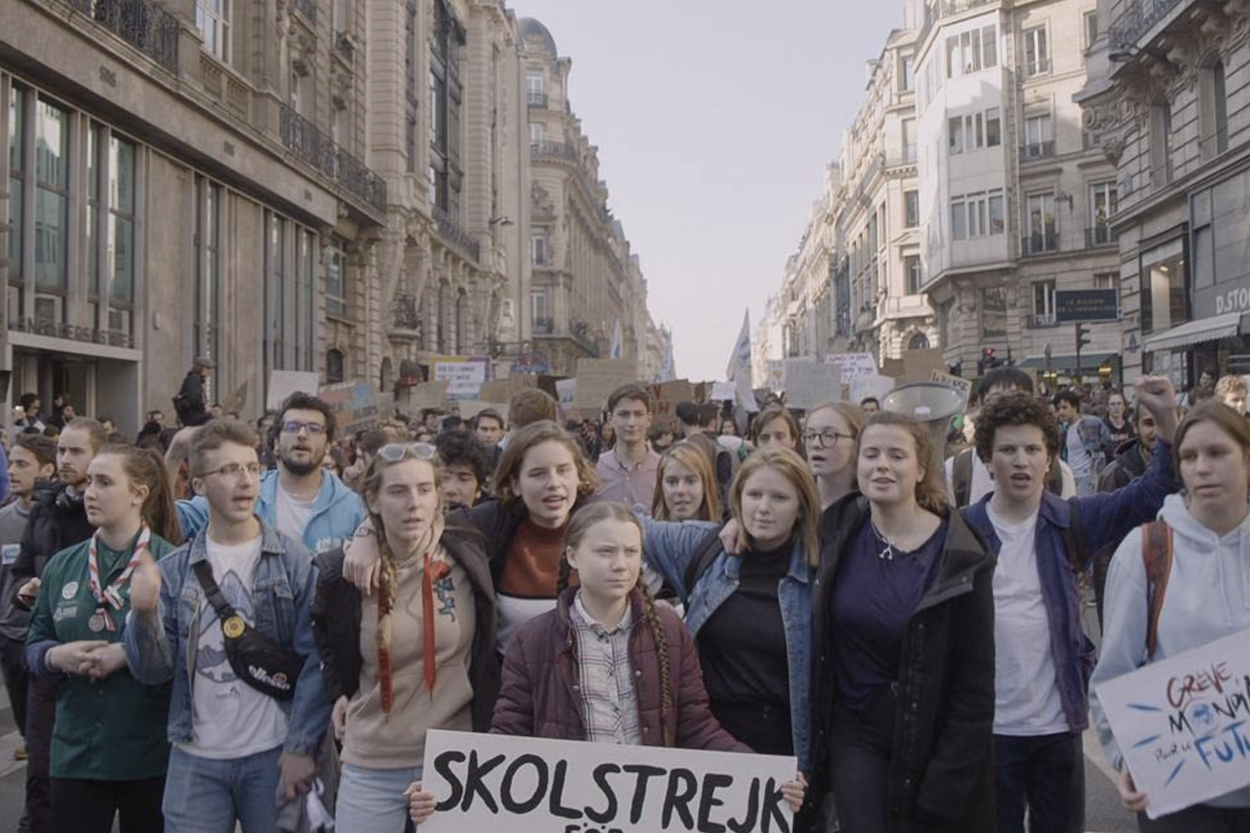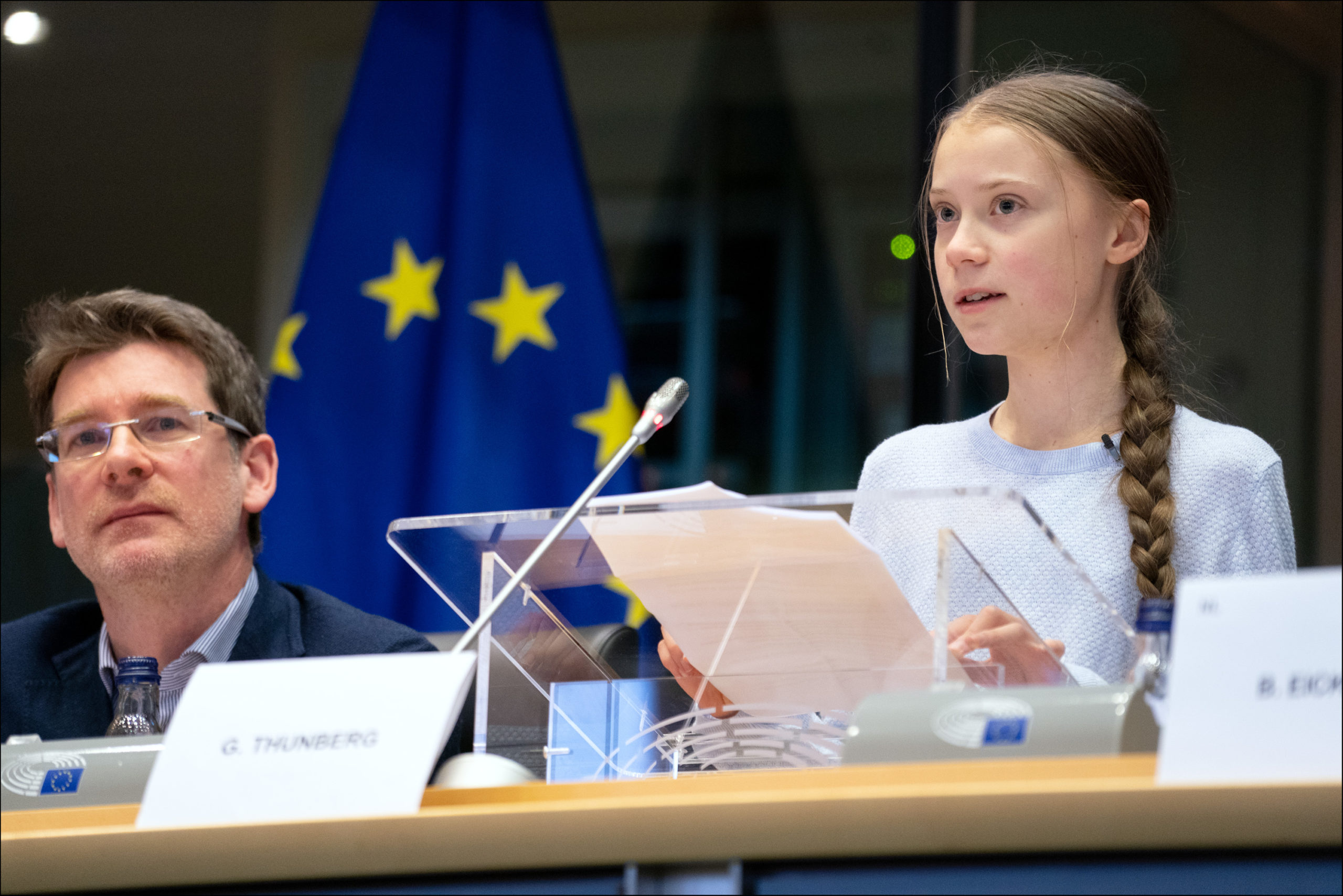by Enbion Micah Aan
語言:
English /// 中文
Photo Credit: Film Poster
I AM GRETA is a documentary film about climate activist Greta Thunberg, the central figure of the 2018 climate strike movement. Thunberg, a high school student, started protesting the inaction of the government in regards to climate change by skipping school and going on strike on Fridays. This simple act of rebellion, at first done only by Thunberg herself, slowly caught the attention of other students, and eventually grew into a global climate strike movement, participated by students around the world. Thunberg’s reputation was catapulted to celebrity status by the media, and as a result, she was invited to many UN climate meetings.
The documentary gives the audience an inside look into the climate campaign and allows the viewers to go behind the scenes. It is an intimate look at not only Greta the activist, the icon, the celebrity, but Greta the person. It is not a film that sets out to convince people that climate change is indeed happening. For people who do not accept climate change as a real man-made phenomenon, the film probably would not make much emotional sense. For a climate activist, the film can be simultaneously hopeful with a strong central figure who inspired a movement amongst the young and yet downright depressing in witnessing the inaction of adults in powerful leadership positions.

Film Still
The film does not hide the fact that Thunberg’s fame was created by the media and institutions and politicians were only interested in what she had to say, as an attempt to co-opt the climate movement for public relations purposes. In one point in the movie, Thunberg wonders out loud why she was even invited, reflecting on her being invited to speak at conferences and the lack of action from the institutions that invited her.
This tension between Thunberg’s genuine wishes and her being the symbol of the overall climate movement and institutions’ stubborn refusal to act is at the very core of the film. The most successful and often poignant moments of the film is for us to understand the emotional context of what Thunberg famously said in conferences, in explaining Thunberg’s frustration and anger in her speeches. After all, she fully understood that she was invited to speak only as a PR move with no actual power to influence public policy. Though an introverted individual, and with great pressure on her, she embraced the responsibility of speaking up against the inaction of governments around the world. The fact that she was made a celebrity by the media was not something she planned – in the very first line of the movie, she remarked, “Everything I experienced over these last few months is like being in a dream or a movie, but it’s a very bad movie because that movie would be very unrealistic.”
The irony is that, despite Thunberg’s and her fellow activists’ young age, they are more mature in understanding the impact and implication of climate change versus adults who obviously prioritize the economy over ecology. Or as Vladimir Putin put it: “People in Africa and in many Asian countries want to be as wealthy as people in Sweden…” It is striking that white person in a powerful leadership position, from an oil producing nation, is willing to single out people in Africa and Asia as an excuse for refusing sensible political actions for climate change, when it is quite clear that people and governments around the world all need to take part if there could be any chance of combating climate change.
Politicians and powerful people probably deem the climate strike movement and people like Thunberg as exceedingly naive. After all, the adults in charge will be dead when climate change’s most drastic impacts will be felt. As such, it is important to view the climate strike movement as a generational conflict. The old want to exploit the environment to its fullest and ultimately irreversible extent, and the young, knowing they will face the consequences, would like the old to slow down the economic development.
Thunberg, other than being able to carry on with the pressure of her unexpected fame, is also a rare type of activist who insists on being as environmentally friendly as possible in everything she does. She refused to take the airplane, so instead she took a sail boat to travel from Europe to New York and did the same for her trip back to Europe. This is actually where the film started, on the sailboat. The viewer got to see how uncomfortable the trip was and the emotional toll it took on Thunberg. Knowing the carbon footprints of animal products, Thunberg also refuses meat, and she found it disappointing that in climate conferences, there were hardly any plant-based options.
This stubborn but morally consistent insistence on her personal behavior does not make Thunberg a saint, but it merely means that she’s trying also in her personal life. Nor does this insistence on her personal behavior mean that her position on the complex issue of climate change would be that the problem can be fixed simply by individuals’ changes in behavior. The fact that Thunberg’s speeches insist on political actions, as opposed to proselytizing personal changes shows that Thunberg has intellectual maturity that is rare for people of any age. This emphasis on politics is a particularly wise insight, as corporations would much prefer putting the onus on individuals by selling customers the fantasy that buying “green” can resolve the issue of climate change, and corporations, in fact, bombard us with corporate green virtues and “ethical consumption” constantly.

Photo credit: European Union
Other than the climate strike movement, the film is also a very personal film, including the tender portrayal of the relationship between Thunberg and her father, how Thunberg deals with her obsessive-compulsive personality, and how her not being neurotypical can be at times be callously seen as “mental illness” by her distractors. There are many scenes that give us insights as to what it is like to be in Greta’s shoes and what it is like for Greta’s father to take care of her famous daughter. One of the most powerful, funny, and at the same time poignant scenes is when Thunberg reads a “Mean Tweet” about herself—she found the overtly rude and inappropriate comment funny, but the viewer comes away understanding these comments have a profound impact on her father.
I Am Greta, though a relatively conventional documentary, is thoughtfully and skillfully made. The documentary will likely become more and more significant as the effects of climate change become more and more apparent. The filmmakers excel at juxtapositions—the contrast between the proponents and opponents started from the very beginning of the movie. The film did not shy away from juxtaposing the energy of the climate strike movement and the movement’s condescending distractors. Coupled that with the juxtaposition of inaction of powerful figures such as French President Macron despite world-wide protests, the future generation who have to face the dire consequences of climate change will be able to watch this documentary and find contemporary institutions and powerful figures of our time to be exceedingly irresponsible if not downright evil. It is not hard to imagine, in a few decades, how this film might end up being an incendiary indictment of the past generation—our generation will likely be seen in the same light as previous irresponsible generations who committed all sorts of atrocities.



